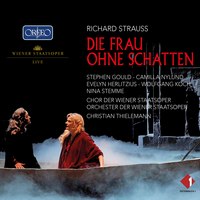Passionate admirers of FroSch know that when a new recording arrives it has to be heard immediately. The work is so gigantic, with so many working parts in its three-and-a-half-hour playing time (when complete), with so many possible pitfalls in the casting alone, that it has to be heard and heard again as soon as possible to be digested. And a less than sonically top notch recording can damn the whole project.
For such a long work, there’s very little waste. Cuts abound in most recordings, and while they do nothing to help the already messy plot, the (usually) 15 to 30 minutes of music eliminated do not make for a less challenging, engrossing, and–let me say it–overwhelming evening at the opera.
This performance, though impressively sung/acted, probably will be most lauded for its conducting and the ravishingly beautiful playing of the Vienna forces under the absolute control of Christian Thielemann. Aficionados may balk at Thielemann’s approach from the beginning of the opera. The three opening chords are invariably played as a punch to the gut; Thielemann lets us clearly hear the nasty, threatening snarl they produce–low-pitched instruments piled one atop the other. This is a hint of the menace to come, not the menace itself. But lest you feel that Thielemann is going to conduct this opera’s subtext and not its ferocity, when it actually comes time to release the hounds, he offers a maelstrom: the voyage from the Royal Realm down to earth is rambunctious and raucous, and the cataclysm when the Nurse is punished is unforgettable. As Strauss’ only sustained, thoroughly atonal moment, it had better pack a wallop and it does.
After the Nurse loses to Keikobad, we find ourselves back in the heavenly realm, where we first met the Emperor, with glissandos from the violins and a palpable sheen. The gorgeous tune on the cello with violin and celesta in Scene 1 remains in the memory, and the falcon’s cry from the woodwind, so often ugly and nagging, is filled with longing and sadness. And if the ravishing orchestral interlude as Barak and his wife can’t find the words they want doesn’t melt you, well, it’s neither Strauss’ nor Thielemann’s fault. This is delicate music making, and when the three or four perorations the opera has to offer come, they blow the listener’s head off.
Say what you will about the three sopranos and their recorded counterparts, but Camilla Nylund, Evelyn Herlitzius, and Nina Stemme actually sound like the characters they’re portraying. Yes, each has some sore patches above the staff, but come on, just listen to those roles, performed complete, in a live performance!
But Nylund’s Empress has it all. From her graceful, girlish entrance–high staccato D and all–we follow her through the “why not take someone else’s shadow” journey to an unspoiled, empathetic woman of the final pages. She moves from brittle to valiant through a series of overheard moments that change her outlook, and we follow each stage with fascination. Her terrifying confusion before “Ich…will…nicht” is as alarming as the music right after it is welcoming and forgiving. No, she will not make you forget Rysanek, but her arc, and particularly the vocalism in Act 3, is breathtaking.
Herlitzius clearly has not escaped the damage that can be wrought after many, many Elektras, but her total commitment, bright, nasty sound, and way with the text–an audible snarl is a very special tool–more than makes up for a few shrill high notes. Strauss wanted a mezzo, and Herlitzius is not a mezzo; some darkness in mid and bottom voice is missing. But boy is she hateful, an ideal contrast to the Empress’ essential goodness.
The Dyer’s wife may be the heaviest role of all and it is often filled by Wagnerian sopranos–Birgit Nilsson’s laser voice comes to mind. Nina Stemme is more than up to the part. She has been much lauded for her other roles; I have always found her vocally fine but detached at times. Here she is terrific, bringing out not only the Wife’s horrifying lifetime disappointments, but drawing up the warmth and understanding for her reconciliation with the splendid Wolfgang Koch’s Dyer. Their third-act duet makes you realize what happens when honest love has been momentarily poisoned but is, happily, restored. And again, it helps to have Thielemann’s warm understanding of the score’s humanity.
Stephen Gould’s tenor is problematic, but then again so is the role of the Emperor. He has three static scenes and he sings them well enough–not eclipsing James King or Torsten Ralf on any level–but he lacks the royal dignity of the best, and one realizes that all the notes are not quite enough. Sebastian Holecek’s Messenger is scary and finely focused. Others–the falcon, the young man, etc.–are cast from strength.
Almost every FrOSch on the market has something to offer; almost every one has an “ideal” singer in a role. Arguably, the most thrilling are the 1955 pair led by Karl Böhm, but they have cuts; they also have, in exchange, the utterly radiant Leonie Rysanek as the Empress. Startling, she appears in the same conductor’s 1977 recording and comes close to offering the same glories. Both of Karajan’s 1964 live performances suffer from the conductor’s re-arrangement of scenes(!) and deep gashes. Keilberth’s 1963 live set is cut even deeper, and the great soprano Martha Mödl, singing the mezzo role of the Nurse, makes some of the worst sounds I’ve ever heard.
The newer ones include Solti (obstinately motivated, except when slowed to an almost-halt, with Domingo’s “Latinate” Emperor scooping and moaning albeit in gorgeous tones), Sinopoli (who dares to cut the cello solo before the Emperor’s monologue), and Sawallisch (with a harridan-like Ute Vinzing as Mrs. Dyer).
Let’s face it–you need more than one recording of this great, complex, gorgeous work. This new one should be one of them.
































